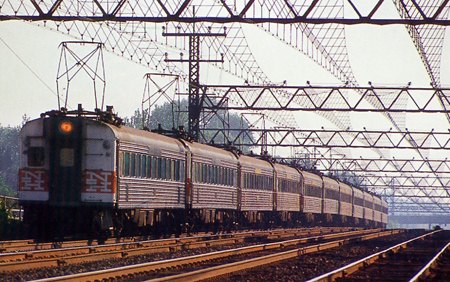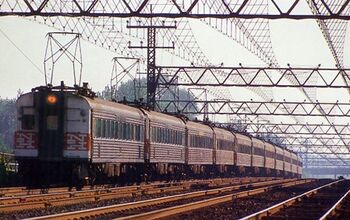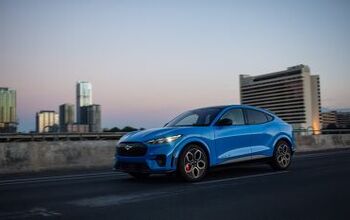Public Transport Be Praised
Cars are sexy, techy and cool. These simple facts tend to obscure any objective analysis of their utility. Like the Space Shuttle or my imaginary clerical staff, if it's sexy, people find a way to justify their love. So it's no wonder that T-TAC's resident pistonhead Robert Farago creased the outside of the envelope when he claimed that cars are the green choice, and labeled public transportation a disgusting aberration fueled by cancer juice and liberal lies.
Not so. Farago's rant relied heavily on a study by Roger Kemp of Lancaster University (UK). Mr. Farago claimed that the study proves that cars are more fuel efficient than trains. Unfortunately, a closer read of Mr. Kemp's study finds that BOTH the train AND the car cited in the study were diesels. The automobile used for comparative purposes was a 1.9L Teutonic miser of a VW, with four passengers on board.
Mr. Kemp's argument on passenger-miles-per-gallon falls further into disrepute when applied to the United States. As opposed to the 55 mpg four-up VW, the average US car carries a gruesome 1.61 passengers at 18 mpg. That's nearly ten times worse than the VW studied– even discounting aerodynamic drag from activist bumper stickers.
Farago's rhetorical reliance on the ultra-cleanliness of new cars is also interesting, but irrelevant. The average US car is more than nine years old. As for his off-hand analysis of bus loading, it's impossible to rebut where there are no facts. At the same time, it's important to note that US trains and buses are far cleaner and more efficient than those in the UK. For a quick comparison of respective air quality standards, visit London, walk around for two hours, and pick your nose.
Of course, that's an entirely subjective measure. Perhaps it's best to leave the air quality debate for others and return to Mr. Kemp's own words about efficiency: 'These findings only apply to long-distance journeys, and then only under an unrealistic assumption of uncongested conditions…. the vast majority of journeys… will remain much less environmentally damaging if we take the bus or train– and use our cars only where no alternative exists.'
Does this mean cars an unforgivable indulgence of a declining civilization, blindly crouched at the vomitorium while locusts mass on the horizon? No. Sometimes, especially in rural or suburban areas, they're the best-– or only-– option. And like Mr. Farago, I love them. But there's no denying that much of what we do with them is stupid.
As a car enthusiast, it breaks heart my heart to see a WRX STi idling next to me for an hour on the Beltway, like a leopard chained to a cement floor, or, worse, abandoned for 20 hours out of the day. Commuting trips-– and they're most of the trips we make-– are the wrong place for cars. Hell, I'd ship myself to work if I could. Since FedEx has proven to me they can't be relied on in this capacity, I use the next best thing: the DC Metro. And I'll try to make you, too.
Farago claims that environmentalists want to use a "political, moral or financial sledgehammer" to "bludgeon" you out of your cars. I don't. But I am sick of paying for them.
My taxes bought the road you're idling on and the troopers and snow plows and medevac flights that come with it; as sure as they bought the El train blowing past you on the left. More than $40 billion per year in the next highway bill, not including state taxes. I also work on a volunteer rescue squad, cutting you out of, and where possible, patching you up after innumerable wrecks, gratis. (Admittedly, sometimes a non-metaphorical sledgehammer is required.)
Overall, that's fine. The government pays for train tracks and air traffic control, too. A free, modern nation has to allow free movement throughout the country, and this can only be privatized so far. The costs associated are immense; we have to spend public money to get people places. My problem comes when we do it stupidly.
We do a lot of bad mass transit; Amtrak is an inexplicable zombie corporation hideously mutated by pork-barrel politics. In a giant country, long-distance rail travel really can't be more than a curiosity. But done right-– regional rail lines, commuter trains, car sharing services, intelligently-scheduled buses, carpooling facilities and HOV– public transit makes things cheaper and cleaner for everyone. Leave your cars for the places they make sense and produce fun.
Bottom line: I'm keeping my car, and you can have yours. But I'm not voting for $600 million for an eighth commuter lane for us all to drive to, park on, and swear at each other. I'd rather drop my "financial sledgehammer" on a fast intercity train, where I can have a quiet coffee and read through some studies-– before I post them on the net.
More by Colin Murchie
Latest Car Reviews
Read moreLatest Product Reviews
Read moreRecent Comments
- SCE to AUX Norway is in Europe, and Tesla is an American automaker - no problems there.I wouldn't use Ford as the bellwether.https://www.reuters.com/business/autos-transportation/tesla-extends-lead-norway-evs-take-record-82-market-share-2024-01-02/https://elbil.no/english/norwegian-ev-policy/
- Steve Biro If the U.S. government wants to talk about banning all connected cars - or at least the collection and sharing of information from said vehicles - I’m all ears. Otherwise, don’t waste my time.
- Ajla Both parties are in favor of banning Chinese vehicles so I don't see how it won't happen in the next year.
- Add Lightness I don't waste a lot of time watching nothing much happening by watching the YouTube 6 minute highlights.
- MrIcky from my rental fleet experience, id rather drive one of these than a camry.






































Comments
Join the conversation